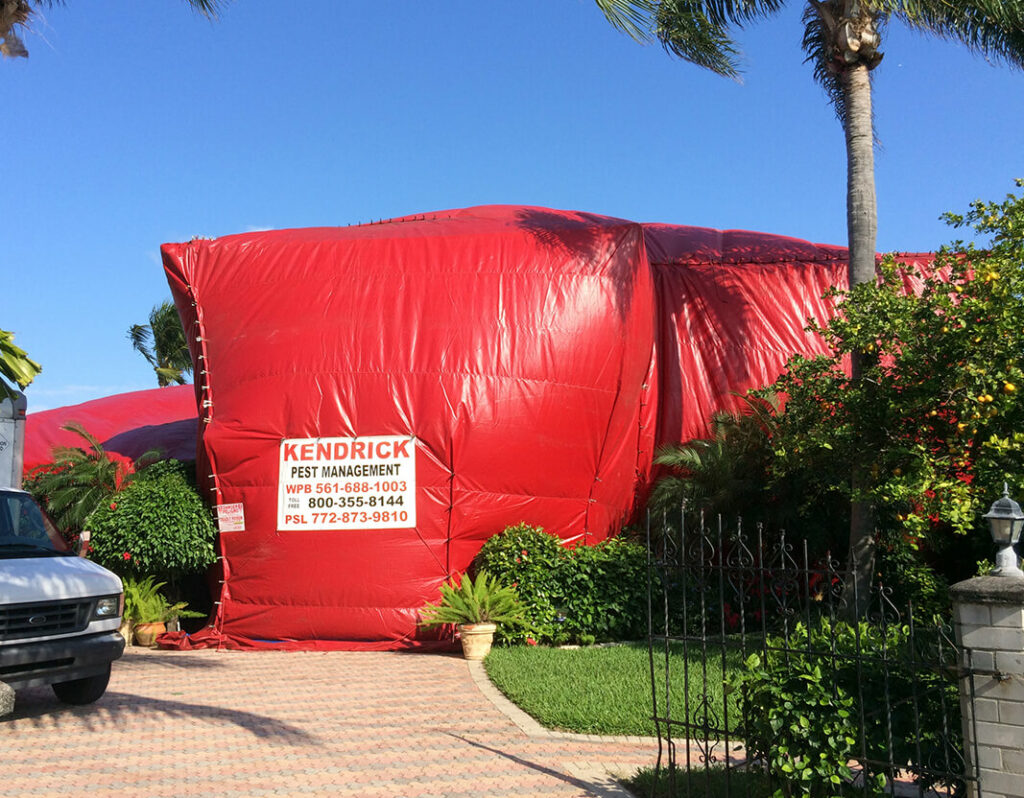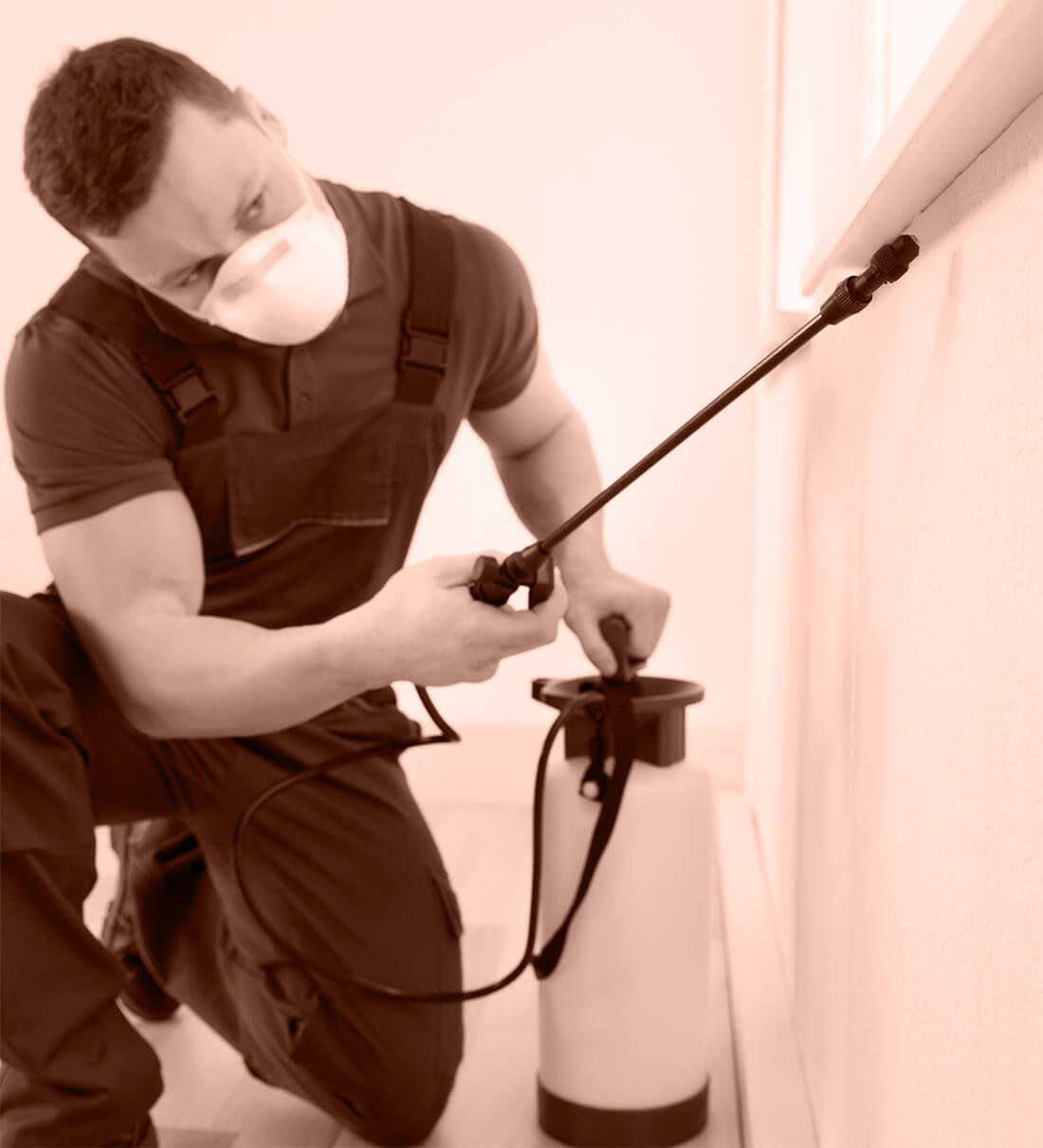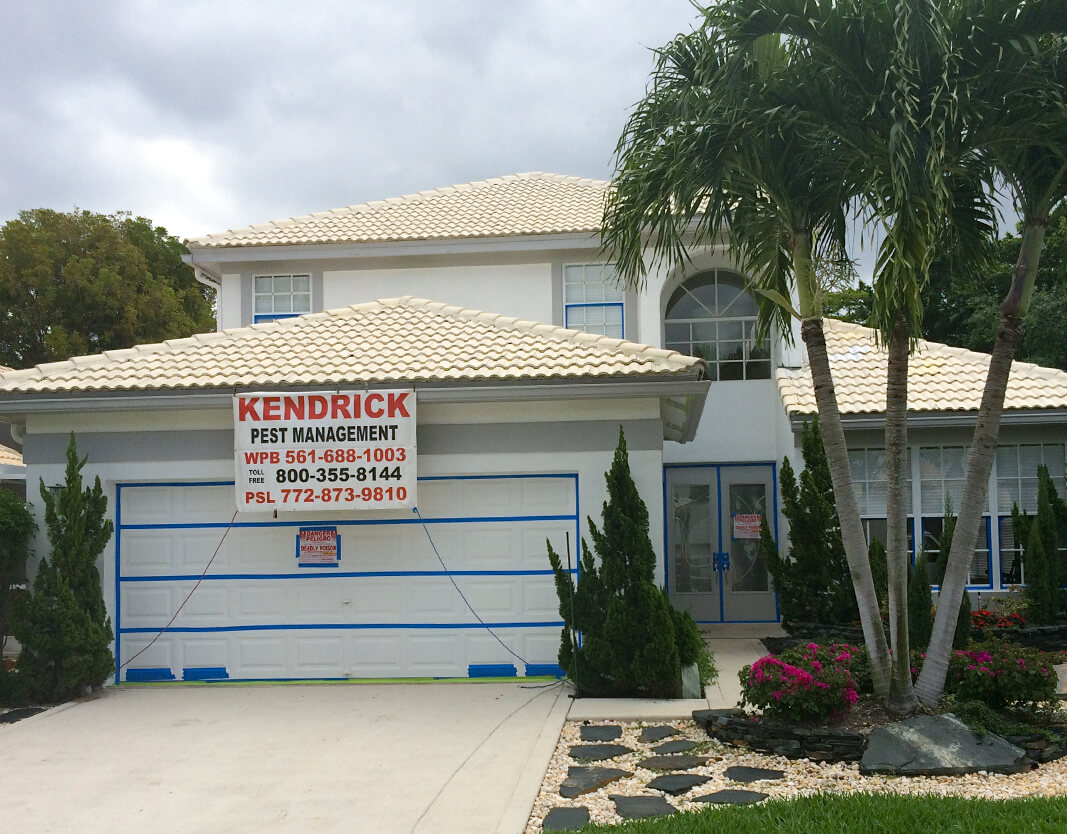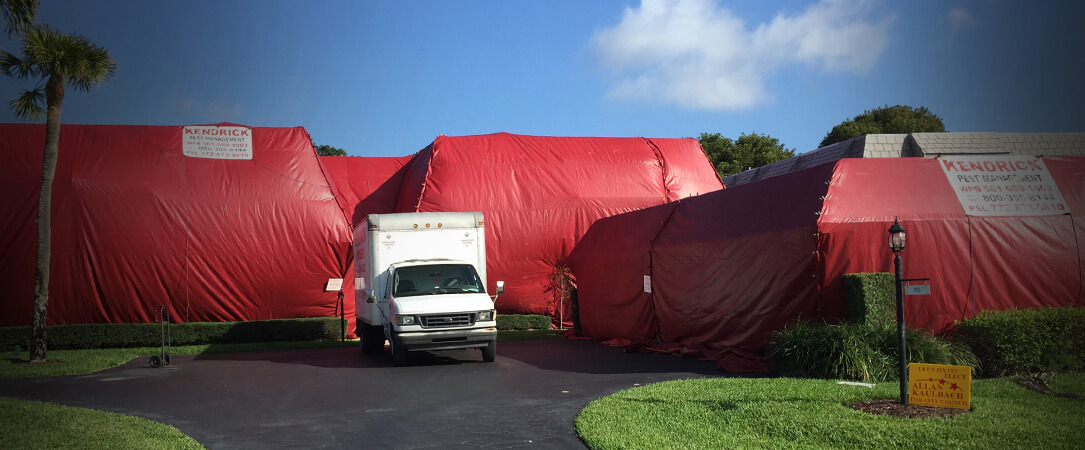
Have you ever seen a giant striped tent reminiscent of a carnival or circus? The chances are quite high in Florida – not because the state is home to traveling circuses, but because of its higher demand for pest control. Yes – these tents are for fumigation!
Fumigation

Tent fumigation (also known as structural fumigation or whole-structure fumigation) is a strategy to eliminate pests from an entire home or building. It is a reliable option for severe pest infestations that cannot be controlled otherwise. These infestations can be from termites, wood-boring beetles, bedbugs, or other insects.
This treatment is exactly how it sounds – we enclose your home or building in a tent made from a strong water-resistant and impenetrable material. This ensures no critters escape and – more importantly – the fumigant gas stays inside. With nowhere to go, the gas can spread through every nook and cranny of the structure, killing every pest present.
Tent fumigation is a very intense treatment. Kendrick Pest Management is here to perform effective tent fumigation that is safe for you, your family, and the environment.

Preparing for
Tent
Fumigation
Preparing for tent fumigation is crucial for safety and effectiveness. There are a few ways to get ready for tent fumigation, whether for your home or building.
Before your fumigation, it’s helpful to double-check if tent fumigation is permitted in your zone. Once you schedule the fumigation, we will give a more detailed outline of how to prepare for your tent fumigation. This will also include providing you with Fumiguard bags to protect your food and other specific consumables during the process.
Last, but not least – you need to choose a reputable fumigation company with experience and licensing in tent fumigation. This treatment is powerful and must be done by specialists who know how to administer fumigants safely for you and the environment.
Fumigation

Usually, fumigation requires tarps to seal a home or building. With tape and seal fumigation, painters’ tape and plastic sheeting are the tools used to cover specific areas of a structure, while the exterior serves as the remaining ‘seal’ for the fumigant.
Tape and seal fumigation has a few benefits. First, it’s much less hassle when it comes to preparing your home’s exterior for fumigation. In comparison to tent fumigation, it puts your home at less risk of exterior damage (e.a. to your roof, irrigation heads, or AC unit). However, this means your exterior areas are left untreated, leaving attached decks or patios, wooden trim, and fascia boards vulnerable to pests.
Not every home or building is a candidate for this type of fumigation. A quick inspection by an experienced technician will confirm your eligibility.
Fumigation
How fast does tent fumigation take?
The fumigation takes at least two days, depending on the building and the time of the week. It is always best to book your fumigation in advance so we can plan the treatment that works efficiently for your time frame and schedule.
What products do you use?
We use one of the best fumigants on the market called Zythor by Ensystex. It is a reliable product used to safely and successfully fumigate museums, churches, schools, government buildings, and millions of residences nationwide.
How do you ensure the area is safe after the tent fumigation is complete?
Before anyone is allowed into the fumigated area, we check the entire property with a Sectros Explorer IR. This tool checks the air for any trace of fumigants. Every property we treat is cleared with this monitor before re-entry is permitted.
Do I have to remove all food from the property before fumigation?
No. However, we provide you with Nylogaurd bags in which you must place all consumable items, such as:
- Medicine
- Pet food
- Fruits and Vegetables
- Cereals and cookies
- Food in the refrigerator and freezer
- Consumables in your pantry
Canned or factory-sealed consumable items do not need to be in the bags.
What about my plants and pets?
There shouldn’t be any living things inside the structure during fumigation. This goes for all pets, whether a dog or a fish. Please take into consideration also any outdoor animals – like dogs or cats – who may try to get back inside the property. Entering while the home is full of gas could be catastrophic.
Are toys safe during the process?
Yes. They do not need to be washed after the fumigation. The only thing is to make sure all bags and boxes stay open for proper aeration.
Can I leave my car or motorcycle on the property?
This is up to you. However, we suggest removing all vehicles from the property to avoid potential damages. Due to the nature of our work and the heavy materials we work with, we cannot guarantee that vehicles will be completely unaffected. It’s always best to air on the safe side by moving valuables off the property. However, if vehicles must be left inside, we will do our best to keep them untouched. In this case, we will require you to sign a waiver/ disclaimer and request full access to the vehicles during the fumigation.
I have a safe on my property – how is this handled during tent fumigation?
Safes must be open during the fumigation to ensure no consumables or other items inside can be tainted. We advise to take all valuables out of the property before the fumigation. While we will keep your property locked during the process, it will not be watched when our technicians are not there.
Do I have to wash my dishes or clothes after?
No, this is not necessary. Remember – fumigant is just a gas. It will go through your dishes, clothes, and other items. But it will not stick to them! During the aeration process, all the fumigant on the building is pumped out of the structure with industrial-sized fans. This aeration will clear any fumigant potentially around your clothes, dishes, and cabinets. We will never apply liquids, powders, or anything that can stick to your items.
Can I allow the fumigator to access the property via a door code?
No. Florida state law requires us fumigators to have access to a building that can be secondarily locked – meaning no one else can access the structure besides the fumigator. Door codes cannot fully guarantee someone else cannot enter the building during fumigation, making them unable to prevent a potentially dangerous situation. Therefore, we require a key to access each unit of the building. If this isn’t an option, we may request to install temporary padlocks to comply with state law.
How do I prepare for tape and seal fumigation?
The same way you would any fumigation. We will provide detailed instructions prior to the treatment so that you can make sure your home or building is prepared.
How do I know if my home qualifies for tape and seal fumigation?
A visit from one of our technicians can inform you of the eligibility of your home or building for tape and seal fumigation. Give us a call and we can schedule an appointment that suits your schedule.

